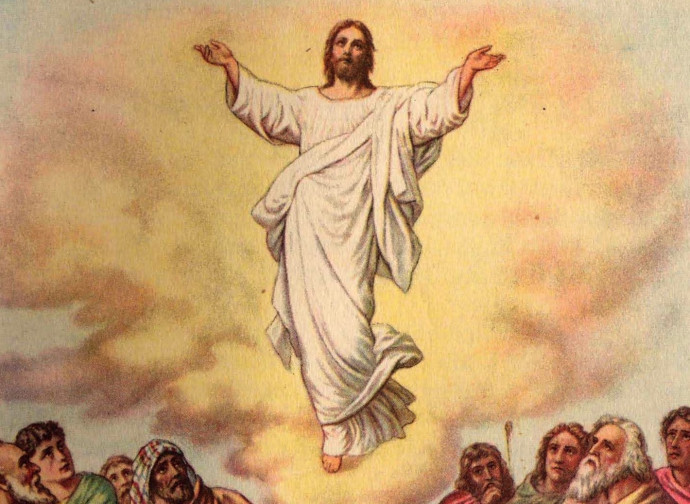Ascension of the Lord
“Men of Galilee, why do you stand looking up at the sky? This Jesus, who was taken up from you into heaven, will come in the same way as you saw Him go into heaven” (Acts 1:11).

“Men of Galilee, why do you stand looking up at the sky? This Jesus, who was taken up from you into heaven, will come in the same way as you saw Him go into heaven” (Acts 1:11). The words of the two angels who appeared to the disciples while they were still trying to see the glory of Christ, taken from their gaze by a cloud, close the biblical account of the Lord's Ascension, the event which marks the beginning of the Church's mission.
It is highly significant that Jesus returns to the Father by ascending from the very summit of the Mount of Olives. There the sorrowful mystery of His total abandonment to the Father's will was fulfilled, when He took upon His sacred humanity, dripping sweat and blood, the weight of the sins of all peoples of all times. The Ascension is the glorious completion of that mystery: the body of Jesus, together with his soul and His divinity, enters definitively into divine glory and points the way to those who love Him.
In the Acts of the Apostles, Luke writes that the Risen Jesus appeared to the disciples for 40 days, giving them the last instructions about the Kingdom of God and announcing the fulfilment of another glorious mystery, Pentecost: “[...] But the Holy Spirit will come upon you and give you power. Then you will tell everyone about me in Jerusalem, in all Judea, in Samaria, and to the ends of the earth” (Acts 1:8). Already at the Last Supper, Jesus had explained to the apostles the necessity of His visible detachment in order for them to be filled with the Holy Spirit (“it is good for you that I am leaving, for if I do not leave, the Comforter will not come to you”). And He prophesied that the proclamation of the Gospel would be accompanied by persecution. At the same time Peter and his companions had been made aware of the ultimate goal of the whole divine plan, also enclosed in the words of Jesus: “There are many rooms in my Father’s house. […] I am going there to prepare a place for each of you” (Jn 14, 2).
The glorification of Jesus is therefore the prelude to the glorification of the members of His Mystical Body, the Church, called to continue His mission on earth. Christ's Bride is strong in the promise made by Him on the day He proclaimed the primacy of Peter: “And the gates of hell shall not prevail against her” (Mt 16:18). A promise that contains the announcement of the battle destined to continue until the end of the world, and of the choice - between God and the Enemy, between his Word and the lie - which every soul will have to face. Eternal bliss is the reward for those who will win their spiritual battle and gain a place in Paradise. There awaits us the Son, who “sits at the right hand of the Father”, as we profess in the Creed and read in the Holy Scriptures. Knowing full well that Jesus made Himself perpetually and truly present in the Eucharist, salvific nourishment for the goods of the Heavenly Jerusalem.
The liturgical celebration of the Ascension has very ancient origins and has been attested to since the fourth century. Falling 40 days after Easter, the solemnity of the Ascension is celebrated on the Thursday of the sixth week of Easter or, in countries where it is not a public holiday, it is postponed until the following Sunday.
In the past, in the three days before the Ascension, Rogations were widespread, today unfortunately in disuse but never abolished. After a series of natural disasters, they were introduced in the 5th century by Saint Mamertus of Vienne, who instituted a wonderful triduum of prayers, fasting and solemn processions to ask God's favour with confidence. It would be good to revive them.
